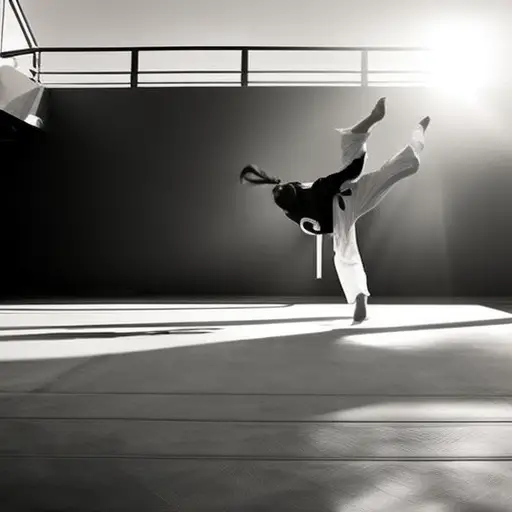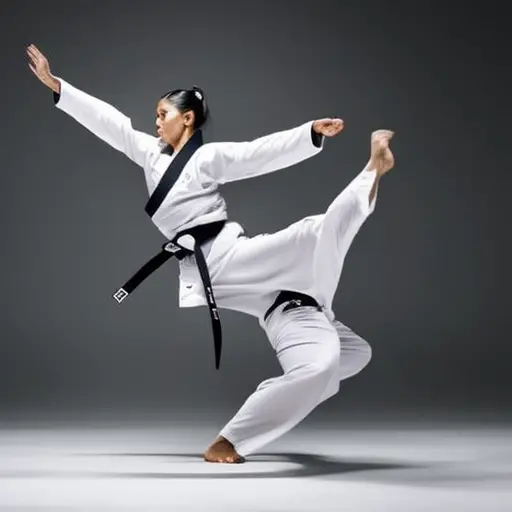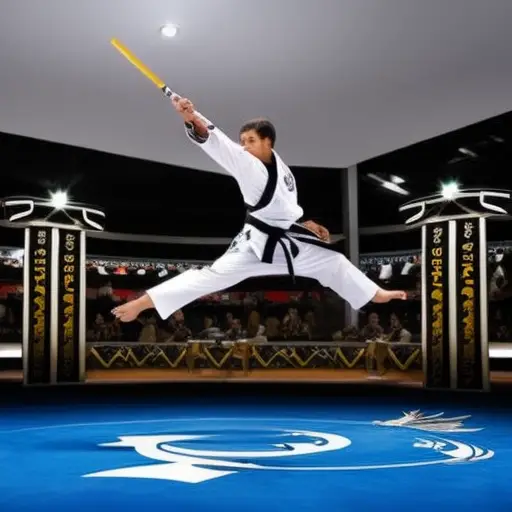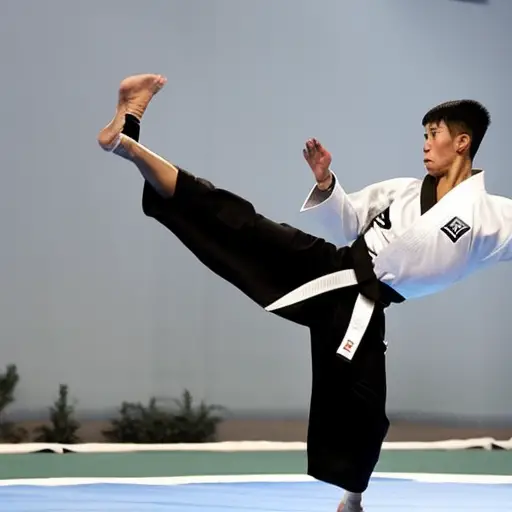The Physical and Mental Benefits of Taekwondo

Taekwondo, the ancient Korean martial art, has gained significant recognition for its multitude of physical and mental benefits. This research-based article delves into the remarkable advantages practitioners can expect to experience.
From improved fitness and strength to enhanced flexibility and balance, Taekwondo offers a comprehensive workout that engages both body and mind. Additionally, the practice promotes mental focus, concentration, stress relief, and emotional well-being.
Boosting confidence and self-esteem, Taekwondo proves to be a practical and effective means of holistic self-improvement.
Improved Fitness and Strength
One of the key benefits of practicing Taekwondo is the significant improvement in overall fitness and strength. The physical demands of this martial art require practitioners to engage in various movements that enhance their endurance and coordination.
Taekwondo is a full-body workout that helps improve cardiovascular fitness and stamina. The high-intensity kicks, punches, and blocks performed during training sessions challenge the cardiovascular system, leading to improved endurance. Regular practice of Taekwondo can result in increased lung capacity and a stronger heart, allowing individuals to perform physical activities for longer periods without feeling tired.
Additionally, Taekwondo involves a wide range of movements that require coordination between different body parts. The practice of precise techniques, such as kicks and punches, helps improve overall coordination and body control. The repetition of these movements during training helps individuals develop a better sense of their body’s position in space, leading to increased accuracy and efficiency of movements.
Furthermore, the strength required to execute powerful kicks and punches in Taekwondo leads to improved muscular strength and tone. The practice of Taekwondo involves various exercises that target different muscle groups, including the legs, arms, and core. This comprehensive workout helps develop lean muscles and increases overall strength.
Enhanced Flexibility and Balance
A significant increase in flexibility and balance is a key outcome of regular Taekwondo practice. Taekwondo training involves a wide range of dynamic movements and stretches that target different muscle groups, promoting increased flexibility over time. This is important not only for performing various kicks, but also for preventing injuries and promoting overall physical well-being.
Flexibility is crucial in Taekwondo as it allows practitioners to achieve a full range of motion in their joints, enabling them to execute kicks and strikes with greater power and precision. Regular practice of kicks, such as roundhouse kicks and side kicks, helps to stretch and strengthen the muscles in the legs, hips, and lower back, leading to improved agility and coordination.
Additionally, Taekwondo training requires a strong sense of balance, as practitioners need to maintain stability while performing fast and powerful movements. The practice of forms, or patterns, involves executing a series of precise movements in a flowing manner, requiring a high level of balance and control. This helps to improve coordination and body awareness, which can be beneficial in various aspects of daily life.
Increased Mental Focus and Concentration
Numerous studies have shown that regular practice of Taekwondo results in heightened mental focus and concentration. Taekwondo involves a combination of physical movements, mental discipline, and self-control, which all contribute to improved cognitive function. The practice of Taekwondo requires individuals to pay close attention to their body movements, maintain proper form, and react quickly to their opponents’ actions. This constant engagement of the mind helps to sharpen focus and enhance concentration skills.
One of the key components of Taekwondo is mindfulness. Through the practice of various techniques, such as meditation and breathing exercises, practitioners learn to be fully present in the moment. This heightened mindfulness allows individuals to let go of distractions and focus solely on the task at hand. By training the mind to stay focused on the present, Taekwondo practitioners can improve their ability to concentrate not only during training sessions but also in their daily lives.
Furthermore, the physical aspect of Taekwondo, including kicking, punching, and blocking, requires precise coordination and timing. To execute these techniques successfully, practitioners must be mentally focused and concentrated. Regular practice of Taekwondo helps to develop mental acuity, as individuals learn to anticipate their opponents’ movements and react accordingly. This increased mental focus can have a positive impact on other areas of life, such as work or academics, where concentration and attention to detail are essential.
Stress Relief and Emotional Well-being
Given the demanding nature of modern life, it is important to explore how practicing Taekwondo can provide stress relief and contribute to emotional well-being. Taekwondo is not only a physical activity but also a practice that incorporates various relaxation techniques to enhance emotional stability.
Here are some ways in which Taekwondo can help in managing stress and improving emotional well-being:
-
Breathing exercises: Taekwondo emphasizes deep breathing techniques, which can help reduce stress and promote relaxation. These breathing exercises can induce a sense of calm and help individuals manage their emotions effectively.
-
Meditation and mindfulness: Taekwondo training often includes meditation and mindfulness practices. These techniques can improve emotional stability by allowing individuals to focus on the present moment and let go of worries and anxieties.
-
Physical activity: Engaging in regular physical activity, such as Taekwondo, can release endorphins, which are natural mood boosters. Physical exercise helps reduce stress, anxiety, and depression, leading to improved emotional well-being.
-
Self-reflection and self-discipline: Taekwondo encourages self-reflection and self-discipline, which can enhance emotional stability. By setting goals, practicing discipline, and reflecting on personal growth, individuals can develop a greater sense of control over their emotions and manage stress more effectively.
Incorporating Taekwondo into one’s routine can provide a holistic approach to managing stress and promoting emotional well-being. The combination of relaxation techniques, physical activity, and self-reflection makes Taekwondo an effective practice for stress relief and emotional stability.
Boosted Confidence and Self-esteem
The practice of Taekwondo can significantly enhance an individual’s confidence and self-esteem. Taekwondo training instills an empowering mindset by providing practitioners with a sense of accomplishment and self-worth. As students progress through the ranks and overcome challenges, they develop a belief in their abilities, which translates into increased self-confidence. This newfound confidence extends beyond the training mat and into other areas of life, empowering individuals to face challenges head-on and achieve success.
One of the key factors contributing to boosted confidence in Taekwondo is the acquisition of self-defense skills. Learning how to defend oneself effectively builds a sense of empowerment and self-assurance. As practitioners become proficient in Taekwondo techniques, they feel more secure in their ability to protect themselves and their loved ones. This knowledge not only boosts their confidence but also enhances their overall sense of self-esteem.
Moreover, Taekwondo fosters a positive and supportive training environment, encouraging students to believe in themselves and their potential. Instructors and fellow practitioners provide guidance, support, and motivation, helping individuals develop a strong belief in their abilities. This supportive community enables students to overcome self-doubt and develop a positive self-image.
Frequently Asked Questions
Is Taekwondo Suitable for People of All Ages and Fitness Levels?
Taekwondo is a martial art that can be modified to suit people of all ages and fitness levels. With proper instruction and guidance, it is suitable for seniors and individuals with different physical abilities.
How Long Does It Take to See Noticeable Improvements in Fitness and Strength Through Practicing Taekwondo?
The timeline for noticeable improvements in fitness and strength through practicing Taekwondo varies depending on factors like training frequency and individual abilities. Consistent practice and dedication can lead to significant improvements within a few months of regular training.
Can Taekwondo Help With Weight Loss and Maintaining a Healthy Body Weight?
Taekwondo offers weight loss benefits and helps maintain a healthy body weight through its combination of aerobic exercise, strength training, and increased metabolism. Regular practice and a balanced diet are key for optimal results.
Are There Any Specific Breathing Techniques or Meditation Practices Involved in Taekwondo That Contribute to Its Mental Focus and Concentration Benefits?
Breathing techniques and meditation practices in Taekwondo contribute to enhanced mental focus and concentration. These techniques help practitioners calm their minds, increase mindfulness, and improve their ability to stay present during training and competitions.
What Are Some of the Potential Risks or Injuries Associated With Practicing Taekwondo, and How Can They Be Prevented?
Preventing taekwondo injuries is crucial for practitioners. Common taekwondo injuries include strains, sprains, and fractures. Safety measures such as proper warm-up, wearing protective gear, and practicing proper technique can help minimize the risks associated with taekwondo.
Conclusion
In conclusion, the practice of Taekwondo offers numerous physical and mental benefits. By improving fitness and strength, enhancing flexibility and balance, increasing mental focus and concentration, and providing stress relief and emotional well-being, this martial art form promotes overall well-being.
Moreover, it boosts confidence and self-esteem, empowering individuals to face challenges with determination. Taekwondo truly sets the stage for personal growth and development, making it a valuable pursuit for individuals of all ages and backgrounds.
As the saying goes, "With Taekwondo, unleash your inner strength and soar to new heights."





